 Libri di Benedict Anderson su Unilibro.it) Libri di Benedict Anderson su Unilibro.it)
|
|
2025 |
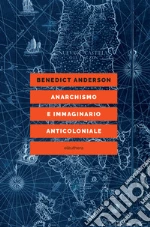 Title :
Anarchismo e immaginario anticoloniale
Title :
Anarchismo e immaginario anticolonialeAuthor: Anderson Benedict Publisher: Elèuthera Grazie a una visione della storia focalizzata sulla prospettiva dei colonizzati, e non dei colonizzatori, Anderson ricostruisce il pathos delle rivoluzioni antimperialiste - da Cuba alle Filippine - attraverso le vicissitudini dei suoi protagonisti. Che non a caso si «radicalizzano» proprio nelle carceri degli imperi occidentali, stringendo relazioni umane e intellettuali con altri ospiti abituali di quei luoghi: gli anarchici europei. Un incontro «esplosivo» - al quale Alfred Nobel dà, volente o nolente, una notevole spinta - che attiva circuiti internazionali di mutuo appoggio in grado di collegare lotte distanti in un sodalizio cosmopolita. D'altronde, dice Anderson, nel farsi della storia lo scambio di idee è altrettanto determinante dello scambio di fucilate. E in questa prima globalizzazione, con la sua marcata accelerazione delle infrastrutture di collegamento, le idee cominciano a circolare velocemente non solo per i potenti ma anche per i dissidenti. Come appunto mostra questa attenta ricostruzione di connessioni sottotraccia che restituiscono la potenza di un incontro che ha scardinato il vecchio mondo coloniale. € 24,00
Scontato: € 22,80
|
|
|
1918 |
 Title :
A Life Beyond Boundaries
Title :
A Life Beyond BoundariesAuthor: Anderson Benedict Publisher: Verso Books € 15,20
|
|
|
2018 |
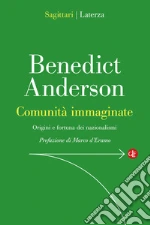 Title :
Comunità immaginate. Origini e diffusione dei nazionalismi
Title :
Comunità immaginate. Origini e diffusione dei nazionalismiAuthor: Anderson Benedict Publisher: Laterza Benedict Anderson indaga un tema di straordinaria attualità: la microfisica del sentimento di appartenenza nazionale, i suoi linguaggi, la sua genesi e la diffusione in ambiti culturali enormemente diversi tra loro. € 20,00
Scontato: € 19,00
|
|
|
1917 |
 Title :
Buried City, Unearthing Teufelsberg
Title :
Buried City, Unearthing TeufelsbergAuthor: Anderson Benedict Publisher: Routledge € 170,50
|
|
|
1916 |
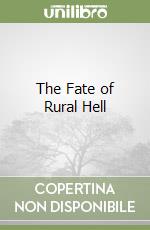 Title :
The Fate of Rural Hell
Title :
The Fate of Rural HellAuthor: Anderson Benedict Publisher: Seagull Books € 15,20
|
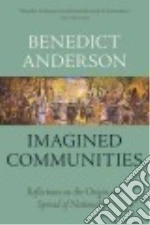 Title :
Imagined Communities
Title :
Imagined CommunitiesAuthor: Anderson Benedict Publisher: Verso Books € 17,90
|
 Title :
A Life Beyond Boundaries
Title :
A Life Beyond BoundariesAuthor: Anderson Benedict Publisher: Verso Books € 22,30
|
|
1914 |
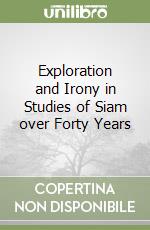 Title :
Exploration and Irony in Studies of Siam over Forty Years
Title :
Exploration and Irony in Studies of Siam over Forty YearsAuthor: Anderson Benedict R. O'G Publisher: Cornell Univ Southeast Asia € 57,20
|
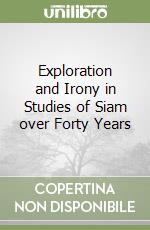 Title :
Exploration and Irony in Studies of Siam over Forty Years
Title :
Exploration and Irony in Studies of Siam over Forty YearsAuthor: Anderson Benedict R. O'G, Loos Tamara (INT) Publisher: Cornell Univ Southeast Asia € 26,40
|
|
1913 |
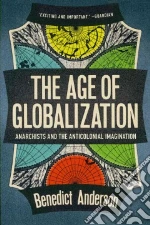 Title :
The Age of Globalization
Title :
The Age of GlobalizationAuthor: Anderson Benedict Publisher: Verso Books History is forged through the travel of ideas across continents—as well as by bombs. The Age of Globalization is an account of the unlikely connections that made up late nineteenth-century politics and culture, and in particular between militant anarchists in Europe and the Americas, and anti-imperialist uprisings in Cuba, China and Japan. Told through the complex intellectual interactions of two great Filipino writers—the political novelist José Rizal and the pioneering folklorist Isabelo de los Reyes—The Age of Globalization is a brilliantly original work on how global exchanges shaped the nationalist movements of the time. € 24,10
|
|
|
1912 |
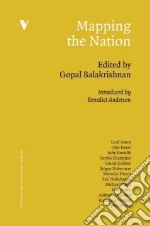 Title :
Mapping the Nation
Title :
Mapping the NationAuthor: Balakrishnan Gopal (EDT), Anderson Benedict (INT) Publisher: Verso Books In nearly two decades since Samuel P. Huntingdon proposed his influential and troubling ‘clash of civilizations’ thesis, nationalism has only continued to puzzle and frustrate commentators, policy analysts, and political theorists. No consensus exists concerning its identity, genesis, or future. Are we reverting to the petty nationalisms of the nineteenth century or evolving into a globalized, supranational world? Has the nation-state outlived its usefulness and exhausted its progressive and emancipatory role? Opening with powerful statements by Lord Acton and Otto Bauer—the classic liberal and socialist positions—Mapping the Nation presents a wealth of thought on this issue: the debate between Ernest Gellner and Miroslav Hroch; Gopal Balakrishnan’s critique of Benedict Anderson’s seminal Imagined Communities; Partha Chatterjee on the limitations of the Enlightenment approach to nationhood; and contributions from Michael Mann, Eric Hobsbawm, Tom Nairn, and Jürgen Habermas. € 24,90
|
 Title :
The Fate of Rural Hell
Title :
The Fate of Rural HellAuthor: Anderson Benedict Publisher: Seagull Books In 1975, when political scientist Benedict Anderson reached Wat Phai Rong Wua, a massive temple complex in rural Thailand conceived by Buddhist monk Luang Phor Khom, he felt he had wandered into a demented Disneyland. One of the world's most bizarre tourist attractions, Wat Phai Rong Wua was designed as a cautionary museum of sorts; its gruesome statues depict violent and torturous scenes that showcase what hell may be like. Over the next few decades, Anderson, who is best known for his work, Imagined Communities, found himself transfixed by this unusual amalgamation of objects, returning several times to see attractions like the largest metal-cast Buddha figure in the world and the Palace of a Hundred Spires. The concrete statuaries and perverse art in Luang Phor's personal museum of hell included, “side by side, an upright human skeleton in a glass cabinet and a life-size replica of Michelangelo's gigantic nude David, wearing fashionable red underpants from the top of which poked part of a swollen, un-Florentine penis,” alongside dozens of statues of evildoers being ferociously punished in their afterlife. In The Fate of Rural Hell, Anderson unravels the intrigue of this strange setting, endeavoring to discover what compels so many Thai visitors to travel to this popular spectacle and what order, if any, inspired its creation. At the same time, he notes in Wat Phai Rong Wua the unexpected effects of the gradual advance of capitalism into the far reaches of rural Asia. Both a one-of-a-kind travelogue and a penetrating look at the community that sustains it, The Fate of Rural Hell is sure to intrigue and inspire conversation as much as Wat Phai Rong Wua itself. € 8,90
|
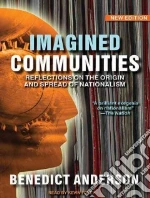 Title :
Imagined Communities
Title :
Imagined CommunitiesAuthor: Anderson Benedict, Foley Kevin (NRT) Publisher: Tantor Media Inc Imagined Communities, Benedict Anderson's brilliant book on nationalism, forged a new field of study when it first appeared in 1983. Since then it has sold over a quarter of a million copies and is widely considered the most important book on the subject. In this greatly anticipated revised edition, Anderson updates and elaborates on the core question: What makes people live and die for nations, as well as hate and kill in their name?Anderson examines the creation and global spread of the 'imagined communities' of nationality, and explores the processes that created these communities: the territorialization of religious faiths, the decline of antique kingship, the interaction between capitalism and print, the development of secular languages-of-state, and changing conceptions of time and space. He shows how an originary nationalism born in the Americas was adopted by popular movements in Europe, by imperialist powers, and by the anti-imperialist resistances in Asia and Africa.In a new afterword, Anderson examines the extraordinary influence of Imagined Communities: he also explores the book's international publication and reception, from its first publication towards the end of the Cold War era to the present day. € 33,60
|
|
1911 |
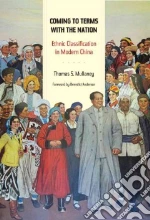 Title :
Coming to Terms with the Nation
Title :
Coming to Terms with the NationAuthor: Mullaney Thomas, Anderson Benedict (FRW) Publisher: Univ of California Pr China is a vast nation comprised of hundreds of distinct ethnic communities, each with its own language, history, and culture. Today the government of China recognizes just 56 ethnic nationalities, or minzu, as groups entitled to representation. This controversial new book recounts the history of the most sweeping attempt to sort and categorize the nation's enormous population: the 1954 Ethnic Classification project (minzu shibie). Thomas S. Mullaney draws on recently declassified material and extensive oral histories to describe how the communist government, in power less than a decade, launched this process in ethnically diverse Yunnan. Mullaney shows how the government drew on Republican-era scholarship for conceptual and methodological inspiration as it developed a strategy for identifying minzu and how non-Party-member Chinese ethnologists produced a 'scientific' survey that would become the basis for a policy on nationalities. € 32,30
|
|
|
2009 |
 Title :
Comunità immaginate. Origini e fortuna dei nazionalismi
Title :
Comunità immaginate. Origini e fortuna dei nazionalismiAuthor: Anderson Benedict; D'Eramo M. (cur.) Publisher: Manifestolibri Questo libro non è solo una storia politica dei movimenti nazionalisti. Il suo obiettivo è soprattutto quello di indagare la microfisica del sentimento di appartenenza nazionale, i suoi linguaggi, la sua genesi e la sua diffusione in ambiti culturali anche diversissimi tra loro. Anderson si serve di innumerevoli materiali, dalle letterature minori alla storia della stampa, per mettere a fuoco le trasformazioni che hanno accompagnato la nascita dei nazionalismi: la territorializzazione delle fedi religiose, il ruolo del capitalismo nascente e dell'opinione pubblica, il nuovo rapporto tra memoria e attualità. € 20,00
|
|
|
2008 |
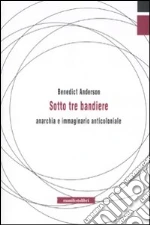 Title :
Sotto tre bandiere. Anarchia e immaginario anticoloniale
Title :
Sotto tre bandiere. Anarchia e immaginario anticolonialeAuthor: Anderson Benedict Publisher: Manifestolibri In questo nuovo libro Benedict Anderson ripensa radicalmente i temi del suo classico testo sul nazionalismo, 'Comunità immaginate', attraverso un viaggio nella politica e nella cultura di fine Ottocento che spazia dai Caraibi all'Europa imperiale al Mar della Cina. Ne emerge un mirabolante incrocio di culture sovversive e anarchiche, dalle Filippine del grande scrittore politico José Rizal agli anarchici catalani, francesi e italiani, dalla insurrezione armata della Cuba di José Marti alle lotte antiimperialiste in Cina e Giappone. Nella contaminazione con le avanguardie letterarie europee e con la cultura rivoluzionaria dei Malatesta e dei Bakunin, si afferma una nuova coscienza anticoloniale e antiimperialista che condurrà alla stagione delle indipendenze. Uno sguardo capace di proiettare nel passato la dimensione globale del mondo di oggi. € 18,00
|
 Title :
Sotto tre bandiere. Anarchia e immaginario anticoloniale
Title :
Sotto tre bandiere. Anarchia e immaginario anticolonialeAuthor: Anderson Benedict Publisher: Manifestolibri In questo nuovo libro Benedict Anderson ripensa radicalmente i temi del suo classico testo sul nazionalismo, 'Comunità immaginate', attraverso un viaggio nella politica e nella cultura di fine Ottocento che spazia dai Caraibi all'Europa imperiale al Mar della Cina. Ne emerge un mirabolante incrocio di culture sovversive e anarchiche, dalle Filippine del grande scrittore politico José Rizal agli anarchici catalani, francesi e italiani, dalla insurrezione armata della Cuba di José Marti alla lotte antiimperialiste in Cina e Giappone. Nella contaminazione con le avanguardie letterarie europee e con la cultura rivoluzionaria dei Malatesta e dei Bakunìn, si afferma una nuova coscienza anticoloniale e antiimperialista che condurrà alla stagione delle indipendenze. Uno sguardo capace di proiettare nel passato la dimensione globale del mondo di oggi. € 32,00
|
|
2006 |
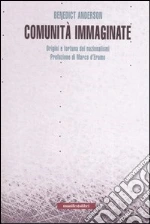 Title :
Comunità immaginate. Origini e fortuna dei nazionalismi
Title :
Comunità immaginate. Origini e fortuna dei nazionalismiAuthor: Anderson Benedict; D'Eramo M. (cur.) Publisher: Manifestolibri Questo libro non è solo una storia politica dei movimenti nazionalisti. Il suo obiettivo è soprattutto quello di indagare la microfisica del sentimento di appartenenza nazionale, i suoi linguaggi, la sua genesi e la sua diffusione in ambiti culturali anche diversissimi tra loro. Anderson si serve di innumerevoli materiali, dalle letterature minori alla storia della stampa, per mettere a fuoco le trasformazioni che hanno accompagnato la nascita dei nazionalismi: la territorializzazione delle fedi religiose, il ruolo del capitalismo nascente e dell'opinione pubblica, il nuovo rapporto tra memoria e attualità. € 18,00
|
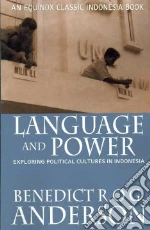 Title :
Language and Power
Title :
Language and PowerAuthor: Benedict, R. O Anderson Publisher: BERTRAMS PRINT ON DEMAND € 23,10
|
|
2005 |
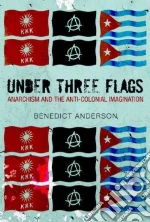 Title :
Under Three Flags
Title :
Under Three FlagsAuthor: Benedict Anderson Publisher: VERSO In this sparkling new work, Benedict Anderson provides a radical recasting of themes from Imagined Communities, his classic book on nationalism, through an exploration of fin-de-siecle politics and culture that spans the Caribbean, Imperial Europe and the South China Sea. A jewelled pomegranate packed with nitroglycerine is primed to blow away Manila's 19th-century colonial elite at the climax of El Filibusterismo, whose author, the great political novelist Jose Rizal, was executed in 1896 by the Spanish authorities in the Philippines at the age of 35. Anderson explores the impact of avant-garde European literature and politics on Rizal and his contemporary, the pioneering folklorist Isabelo de los Reyes, who was imprisoned in Manila after the violent uprisings of 1896 and later incarcerated, together with Catalan anarchists, in the prison fortress of Montjuich in Barcelona. On his return to the Philippines, by now under American occupation, Isabelo formed the first militant trade unions under the influence of Malatesta and Bakunin. Anderson considers the complex intellectual interactions of these young Filipinos with the new 'science' of anthropology in Germany and Austro-Hungary, and with post-Communard experimentalists in Paris, against a background of militant anarchism in Spain, France, Italy and the Americas, Jose Marti's armed uprising in Cuba and anti-imperialist protests in China and Japan. In doing so, he depicts the dense intertwining of anarchist internationalism and radical anti-colonialism. Under Three Flags is a brilliantly original work on the explosive history of national independence and global politics. € 18,10
|
|
|
1998 |
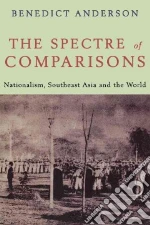 Title :
The Spectre of Comparisons
Title :
The Spectre of ComparisonsAuthor: Anderson Benedict Publisher: W W Norton & Co Inc A controversial collection from the author of the celebrated Imagined Communities. While Benedict Anderson is best known for his classic book on nationalism, Imagined Communities, many of his most telling and incisive interventions have been made in his essays. Those collected in this new book span a range of subjects: from Aquino's Philippines, where the horses on the haciendas ate better than the stable-hands, to political assassination in contemporary Thailand, where government posts have become so lucrative that to gain them candidates will kill their rivals. In these writing, the subtle imbrication of politics, national imaginings, bureaucracy, modernization and its agents (particularly print culture) is brought out in all its complexity and richness. 'The spectre of comparisons' was a phrase used by the celebrated Filipino nationalist and novelist Jose Rizal (1861-96), whose work and fate in the national imagination are discussed in these pages. In his finely wrought observations on Southeast Asian societies, Anderson raises deep questions concerning this spectre, about how, for instance, Manila is changed when it can no longer be seen through a comparison with European capitals, and how, more broadly, nationalism is produce by the process of increasing global connection. The Spectre of Comparisons is an indispensable resource for those interested in South-East Asia. But it also contains important theoretical and historical considerations about nationalism, national literature and memory, modernization, and the prospects for the Left in what Anderson dubs 'The New World Disorder'. € 32,60
|
|
|
Data Pubblicazione 'Non disponibile' |
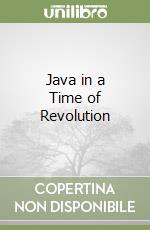 Title :
Java in a Time of Revolution
Title :
Java in a Time of RevolutionAuthor: Benedict, R.O' Anderson Publisher: BERTRAMS PRINT ON DEMAND € 29,30
|